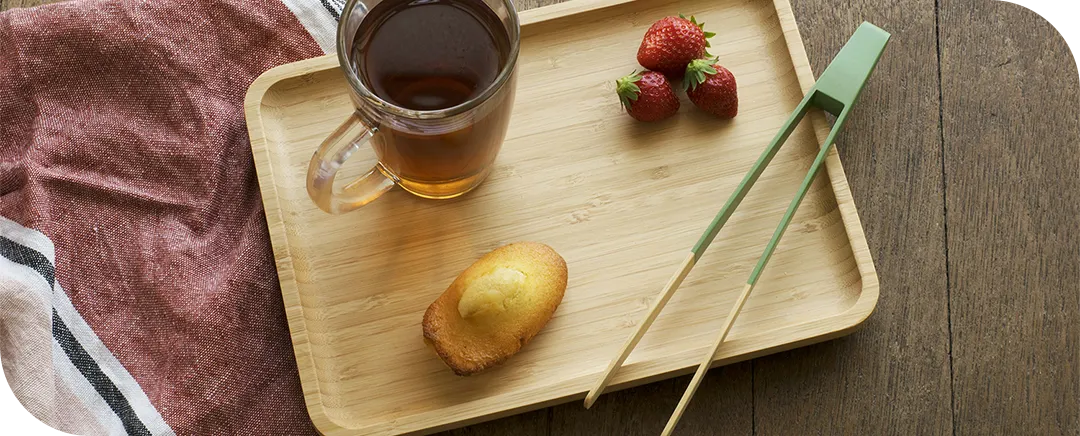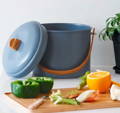
Do you like doing good for the planet? At Pebbly, we do too! We’re all looking for ways to live a more eco-friendly lifestyle, but sometimes it can be daunting thinking about where to start. Look no further than your daily rituals and it will open your eyes to where small changes can be made. After all, one ripple can make waves!
By making a few simple adjustments to your daily habits, you can significantly reduce your environmental impact and help create a more sustainable future. While even this may still seem a bit overwhelming, let’s start in our favorite place – the kitchen!
Getting right into it, here are some quick and easy eco-friendly habits you can adopt at home to live a more sustainable lifestyle for yourself and the planet. We promise, soon you’ll forget about those plastic freezer bags that you use to swear by!
Related: Different Types of Composting
#1. Using reusable containers by switching from plastic to glass
This is one of the easiest and most effective ways to reduce your plastic waste. By now, we all know that plastic is bad for the environment, but it’s something that has been so ingrained into our everyday practices, that it can seem impossible to get rid of it.
While it may be easy to toss away that plastic bag after using it or throw the container away after lunch, you’ll soon realize carrying that glass container home after work or school really isn’t a hassle at all.
Not only are glass containers more durable, long-lasting, and more sustainable than plastic ones, but they are also better for your health. Unlike plastic, glass does not contain any harmful chemicals that can leach into your food over time – and let’s be honest, no one wants that!
While, of course, we’re huge advocates for Pebbly’s zero-waste Stackable Glass Canisters, we’re also big fans of using them alongside repurposed glass jars from pasta sauces, jams, or pickles.
#2. Avoiding single-use plastic
In addition to switching from plastic to glass containers for storing food, being mindful to avoid single-use plastic is a simple action to build into daily habits. Single-use plastics include plastic sandwich and freezer bags, plastic produce and grocery bags, or plastic plates, cups, and cutlery, which immediately go into the garbage after use.
Thankfully, all of these items can easily be replaced with much more sustainable alternatives. Reusable bags, made from sustainable materials like cotton and jute, for your grocery shopping means one less plastic bag being used and discarded. Plus, they can be your cute supermarket accessories, like Pebbly’s XL Everywhere Bag or Organic Cotton Produce Pouches – it’ll make grocery shopping one of your favorite activities.
Sometimes there is a time and place for single-use items, we’ve all been there, and sometimes there is no way around it… but with a little bit of planning, it is possible to reduce these occurrences. You can equip yourself with travel cutlery and collapsible reusable straws when you plan on grabbing some food on the go.
For larger scale events, plant-based or compostable plates, cups, and cutlery are great for picnics or parties – especially for those times when you don’t want to have to worry about the clean-up. While these items are single-use, they are a more eco-friendly option since they can be easily disposed of in a compost bin rather than ending up in a landfill or the ocean!
Related: Composting Infographics
#3. Compost food scraps

Composting is a great way to help reduce the amount of food waste in landfills, and, as a plus, you can avoid those smelly garbage bins stinking up the kitchen. By using compost bins, (which can be very chic looking in your kitchen, might we add), food waste can be turned into nutrient-rich compost instead of a potent greenhouse gas which is, unfortunately, contributing to climate change.
If you’re an urban dweller thinking, “Where am I supposed to compost?” look around for a compost pick-up service, or collect your food scraps in a Compost Bin and donate them to a community garden. Pebbly’s Compost Bin features a charcoal filter that’ll help keep smells in and pests out while you are collecting your food scraps throughout the week. Alternatively, if you have houseplants or a veggie garden at home, add some compost to your greenery and watch how happy your plants become.
Related: Composting 101
#4. Buying products made from sustainable and recyclable materials.

We’ve already mentioned how glass and cotton can make great sustainable swaps, but there’s another material worth noting – bamboo. Buying kitchen utensils made of bamboo instead of wood or plastic is a small way to make a more sustainable choice in your kitchen and for the planet.
Did you know bamboo can harvest 33 times faster than trees, release 35% more oxygen, and function just as beautifully in your kitchen? It’s a cycle of bettering that starts with something as simple as the products you use every day, right at home. Bamboo is a material that is renewable and better for the planet than the commonly found plastics and synthetic fibers or wood that can result in deforestation and habitat destruction. On top of that, you’ll end up saving money down the line because they are more durable and longer lasting – sounds like a win/win!
Incorporating some of the eco-friendly habits is not only beneficial for reducing waste – whether plastic or food. It can also have an impact on your personal environmental footprint, and let’s not pass over the fact that these small daily changes can also save you money!
Spend less on groceries by learning to make a “kitchen sink” dinner and using up leftover ingredients. Being conscious and reaching for multi-use items and those made from more durable, long-lasting materials will help your bank account and allow you to spend your hard-earned money on much more exciting things than plastic sandwich bags.
The fun thing about adjusting your daily habits is that it’s all about you and the choices that you decide to make. Start with whatever you’re comfortable with and watch to see what happens. Every person has their part to play in the larger scheme of sustainability, but doing good feels good, too. Setting examples for those around us, especially our future generations, is important to build a more sustainable future.
Just focusing on the kitchen alone, there are a number of options for incorporating more eco-friendly habits. Switching to glass over plastic, avoiding single-use plastics, composting, or buying more sustainable & recyclable products are easy and quick adaptations to make. Which of these eco-friendly tips are you going to try?
For more sustainable essentials for the kitchen and beyond, check out Pebbly's products – because to #LivePebbly is to choose a better path forward with every little choice that we make.


